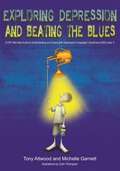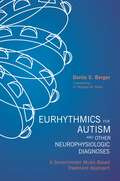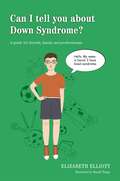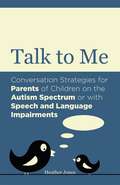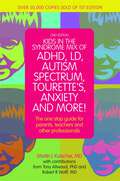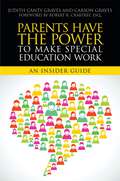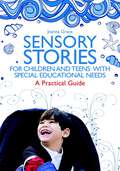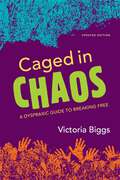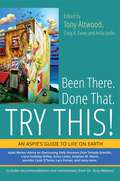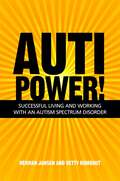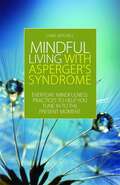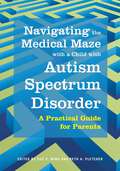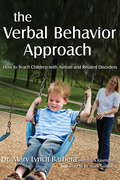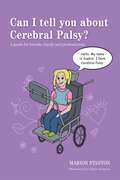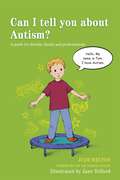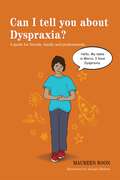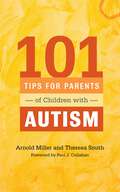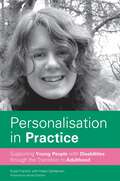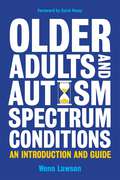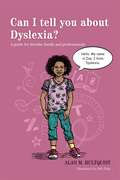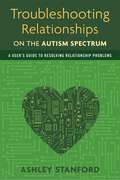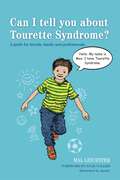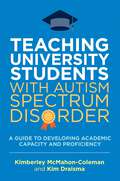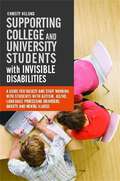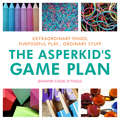- Table View
- List View
Exploring Depression, and Beating the Blues: A CBT Self-Help Guide to Understanding and Coping with Depression in Asperger’s Syndrome [ASD-Level 1]
by Tony Attwood Michelle Garnett Colin ThompsonFor people with ASDs, depression is common, and has particular features and causes. This outstanding book provides a comprehensive review of these aspects, and an effective self-help guide for anyone with an autism spectrum disorder (ASD) affected by depression. Written by the leading experts in the field, the book explains and describes depression, the forms it can take, and how it looks and feels for a person on the autism spectrum. The authors draw on the latest thinking and research to suggest strategies for coping with the effects of depression and provide a complete step-by-step CBT self-help programme, designed specifically for individuals with ASDs. The programme helps increase self-awareness, including identifying personal triggers, and provides the tools to combat depression.
Eurhythmics for Autism and Other Neurophysiologic Diagnoses: A Sensorimotor Music-Based Treatment Approach
by Stephen M. Shore Dorita S. BergerIn Eurhythmics for Autism and Other Neurophysiologic Diagnoses, Dorita S. Berger reveals how Eurhythmics, a method of teaching the musical concepts of rhythm, structure and expression kinaesthetically through movement, can help develop sensorimotor skills in children and adults with autism and other special needs. Covering both theory and practice, she explains this innovative, music-based approach and how it can also address cognitive and sensory issues in adults with debilitating conditions, such as dementia or post-traumatic stress disorder. With a particular emphasis on autism, she provides clear and adaptable session plans, suitable for working with children and adults of all ages.
Can I tell you about Down Syndrome?: A guide for friends, family and professionals
by Manjit Thapp Elizabeth ElliottMeet David - a boy with Down syndrome. David invites readers to learn about Down syndrome from his perspective, helping them to understand what Down syndrome is and how it affects his daily life. He explains that he sometimes needs extra help at home and school and suggests ways that those around him can help him to feel supported. This illustrated book is ideal for young people aged 7 upwards, as well as parents, friends, teachers, social workers and other professionals working with children with Down syndrome. It is also an excellent starting point for family and classroom discussions.
Talk to Me: Conversation Strategies for Parents of Children on the Autism Spectrum or with Speech and Language Impairments
by Heather JonesIf your child finds talking to people a struggle, this is the book to get the conversation started. In this hands-on guide, Heather Jones offers practical advice, born of experience with her own son, which will help you teach your child the principles of communication. Full of strategies and examples, it shows how you can allay fears, build confidence and teach your child to enjoy conversation. Once a child gets used to talking with other people, many life skills can develop more easily as they grow up - from making friends and shopping for themselves, to being interviewed and eventually getting a job. This handy book provides guidance and inspiration to parents, teachers and anyone else who cares for a child who finds language and comprehension difficult.
Kids in the Syndrome Mix of ADHD, LD, Autism Spectrum, Tourette's, Anxiety, and More!: The one-stop guide for parents, teachers, and other professionals
by Tony Attwood Martin L. KutscherThe completely updated and expanded new edition of this well-established text incorporates DSM-5 changes as well as other new developments. The all-in-one guide covers the whole range of often co-existing neuro-behavioral disorders in children - from attention deficit hyperactivity disorder (ADHD), obsessive-compulsive disorder, and anxiety, to autism spectrum disorders, nonverbal learning disabilities, Tourette's, sensory integration problems, and executive dysfunction. A completely revised chapter on the autism spectrum by Tony Attwood explains not only new understanding in the field, but the new diagnostic criteria, and the anticipated usage of the term 'Asperger's Syndrome'. Dr. Kutscher provides accessible information on causes, symptoms, interactions with other conditions, and treatments. He presents effective behavioral strategies for responding to children who display traits of these disorders - whether at home, at school, or in other settings - along with case vignettes and practical tips. Finally, a chapter on the role of medications summarizes current knowledge. The author's sympathetic yet upbeat approach and skillful explanations of the inner world of children in the syndrome mix make this an invaluable companion for parents, teachers, professionals, and anyone else who needs fast and to-the-point advice on children with special needs.
Parents Have the Power to Make Special Education Work: An Insider Guide
by Judith Canty Graves Carson GravesWritten by parents who have been through the US special education system, this book cuts through the jargon to provide other parents with a no-nonsense road map full of valuable first-hand insights and tried-and-tested advice. The authors clearly describe: · the special education process, including the school hierarchies parents are likely to encounter and etiquette to be aware of when dealing with school personnel · the information parents should expect to see in school evaluations and Individualized Education Programs (IEPs), and what to do when this information is missing or insufficient · problems parents may encounter when the needs of the school conflict with the needs of a child, including how to deal with such situations and when to seek legal advice · the importance of organizing special education documentation and establishing a 'paper trail', and how to begin this process · why transition planning is so important, and transition services parents may want to consider for their child. Demonstrating that parents really do have the power to make special education work for their child, this empowering guide is essential reading for parents of children with disabilities who are new to the special education system in the US, as well as those who feel frustrated with the system.
Sensory Stories for Children and Teens with Special Educational Needs: A Practical Guide
by Joanna GraceSensory Stories are short stories of a few lines which are brought to life through a selection of meaningful sensory experiences. They are particularly beneficial for students with Sensory Processing Disorder (SPD), profound and multiple learning difficulties (PMLD), autism spectrum disorders (ASD) and other special educational needs (SEN). For children with PMLD, Sensory Stories can open up new avenues for communication and inclusive learning. For students with SPD and ASD, they offer a fun way of encountering sensory experiences and triggers in a safe, repetitive way, which over time can help to reduce associated anxieties. This accessible guide offers teachers, other professionals working with students with SEN and parents with a complete step-by-step guide to creating and using Sensory Stories effectively. Aiming to make Sensory Stories affordable and accessible to schools and parents alike by using everyday items found in the classroom and home, Joanna Grace provides original, ready-to-use Sensory Stories with accompanying lesson plans, games and activities and adaptations for different abilities and diagnoses. Written by an experienced SEN consultant and sensory learning specialist, this is unique and essential reading for teachers, other professionals and parents wishing to introduce the many benefits of multi-sensory storytelling to children in their care.
Caged in Chaos: A Dyspraxic Guide to Breaking Free Updated Edition
by Jo Todd Victoria BiggsWritten by a teenager with dyspraxia, this is a humorous and inspiring practical guide for young adults with dyspraxia and those around them trying to get to grips with the physical, social and psychological chaos caused by developmental co-ordination disorders (DCDs). In her own conversational style, Victoria Biggs explains the primary effects of dyspraxia - disorganization, clumsiness and poor short-term memory - as well as other difficulties that dyspraxic teenagers encounter, such as bullying and low self-esteem. Peppered with personal stories from other teens, this award-winning book offers down-to-earth advice on a wide range of adolescent issues, from puberty, health and hygiene to family life and making friends. The new edition includes an update from the author on her university and work experiences and how dyspraxia affects her now as an adult. Her positive approach and profound empathy with others in her situation make this book a must-read.
Been There. Done That. Try This!: An Aspie's Guide to Life on Earth
by Paul Isaacs Craig Evans Karen Krejcha Patrick V. Suglia Tony Attwood Liane Holliday Willey Henny Kupferstein John Makin Jeanette Purkis Bob Castleman Larry Moody Steve Selpal Richard Stirling Maguire Lisa Morgan Temple Grandin Mitchell Christian Lars Perner Garry Burge Debbie Denenburg Anita Lesko Alexis Wineman Qazi Fazli Azeem Charlene Devnet Stephen M. Shore Ruth Elaine Hane Mary Robison James BuzonIf you only buy one book to improve your life this year, make it this one. Temple Grandin, Liane Holliday Willey, Anita Lesko, Stephen M. Shore, and many other Aspie mentors, offer their personal guidance on coping with the daily stressors that Aspies have identified as being the most significant, in order of urgency - anxiety, self-esteem, change, meltdowns, depression, friendship, love, and much, much more. Based on years of personal experience, this book is packed with advice from Aspie mentors who have all been there and done that! World expert Dr. Tony Attwood rounds up each chapter with professional analysis and extensive recommendations. He includes essential information on destructive strategies that may look attractive, but that have counter-productive effects. Including full color artwork from Aspie artists showing visually how they interpret each stressor, this is THE inspirational guide to life for young adults, the newly diagnosed, and as a life-long reference for anyone on the spectrum - written by Aspies for Aspies.
AutiPower! Successful Living and Working with an Autism Spectrum Disorder
by Betty Rombout Herman JansenAutiPower! presents a series of candid interviews with adults on the autism spectrum that offers a unique insight into their work and life experiences. Through these inspiring accounts we hear of the many ways that people with autism have overcome challenges and used their autism traits for employment success. Despite his doctorate in Mathematics, Jaap struggled to keep many jobs before realizing that his intense attention to detail that was making him a slow worker became a strength once he learnt to set goals and communicate his progress. Wendy's autism is a big advantage as a special education teacher because she truly understands the children that she teaches. From software engineers, to company directors, to those who work in autism advocacy, the interviewees openly discuss the pitfalls and the positives of working life with autism. Also interviewed are autism professionals, career coaches and employers who discuss the value and great talents that people with autism bring to the workplace.
Mindful Living with Asperger's Syndrome: Everyday Mindfulness Practices to Help You Tune in to the Present Moment
by Chris MitchellBased on his own life experiences, travels and meditations, Chris Mitchell reflects on how mindfulness practice can help people with Asperger's Syndrome (AS) with daily challenges including negative thought patterns, emotional and sensory issues, and navigating the social world. This practical handbook provides advice and instruction on adopting a mindful way of living to help tune in to the present moment and each chapter provides step-by-step mindfulness exercises that allow individuals with AS to overcome obstacles through awareness. Included are breathing exercises, simple yoga stretches, sitting, standing and walking meditations, visualisations, and easy ways to incorporate mindfulness techniques into everyday activities such as eating, brushing your teeth or doing the dishes. By teaching how to live mindfully moment to moment, this book gives people with Asperger's Syndrome the key to relieving stress, increasing awareness, and living a healthier and happier life.
Navigating the Medical Maze with a Child with Autism Spectrum Disorder: A Practical Guide for Parents
by Iona Monterio Susan Connors Lisa Ford Evan Spivack Susan Brill Gary Mcabee Barbie Zimmerman-Bier Thomas Ballesteros Tishi Shah Jennifer Bain Beth Pletcher Sue Ming Devorah Segal Caroline Hayes-Rosen Jeffrey Kornitzer Harumi Jyonouchi Julie O'Brien Mark D. RobinsonThis comprehensive guide enables parents of children with an autism spectrum disorder (ASD) to play an active and effective role in their child's medical care from diagnosis to early adulthood. With a focus on working with health care providers to ensure the best treatment for your child's unique needs, it includes: - a description of the developmental and medical conditions faced by children with ASDs in lay terms - an explanation of common diagnostic tests - a presentation of conventional and alternative therapies and how they work - tips for managing day-to-day medical or behavioral problems - advice for parents considering enrolling their child in a research project - and all the latest medical information. This authoritative and accessible book provides parents of children with an ASD with the foundation of knowledge they need to become an active partner in the medical care of their child and the map that will allow them to navigate the complex medical world.
The Verbal Behavior Approach: How to Teach Children with Autism and Related Disorders
by Mary Lynch BarberaA step-by-step guide on how to help children develop language and speaking skills.The Verbal Behavior (VB) approach is a form of Applied Behavior Analysis (ABA), that is based on B.F. Skinner's analysis of verbal behavior and works particularly well with children with minimal or no speech abilities. In this book Dr. Mary Lynch Barbera draws on her own experiences as a Board Certified Behavior Analyst and also as a parent of a child with autism to explain VB and how to use it.This step-by-step guide provides an abundance of information about how to help children develop better language and speaking skills, and also explains how to teach non-vocal children to use sign language. An entire chapter focuses on ways to reduce problem behavior, and there is also useful information on teaching toileting and other important self-help skills, that would benefit any child.This book will enable parents and professionals unfamiliar with the principles of ABA and VB to get started immediately using the Verbal Behavior approach to teach children with autism and related disorders.(P)2017 Hodder & Stoughton Limited
Can I tell you about Cerebral Palsy?: A guide for friends, family and professionals
by Katie Stanton Marion StantonMeet Sophie - a girl with cerebral palsy (CP). Sophie invites readers to learn about CP from her perspective, helping them to understand what it is like to use a wheelchair to move around and assistive technology to communicate. She also introduces readers to some of her friends who have different forms of CP and explains that living with CP can sometimes be difficult, but there are many ways she is supported so that she can lead a full and happy life. This illustrated book is ideal for young people aged 7 upwards, as well as parents, friends, teachers and professionals working with children with CP. It is also an excellent starting point for family and classroom discussions.
Can I tell you about Autism?: A guide for friends, family and professionals
by Jane Telford Jude Welton Glenys JonesMeet Tom - a young boy with autism. Tom invites readers to learn about autism from his perspective, helping them to understand what it is and explaining the challenges he faces with issues such as social communication, sensory overload and changes in his routine. Tom tells readers about all the ways he can be helped and supported by those around him. This illustrated book is ideally suited for readers aged 7 and upwards, and will be an excellent way to increase understanding about autism, in the classroom or at home. It also includes clear, useful information for parents and professionals.
Can I tell you about Dyspraxia?: A guide for friends, family and professionals
by Maureen Boon Imogen HallamMeet Marco - a boy with dyspraxia, which is sometimes called Developmental Co-ordination Disorder (DCD). Marco invites readers to learn about dyspraxia from his perspective, helping them to understand what it is and what it feels like when he sometimes struggles to control his movement and co-ordination. He talks about the challenges of having dyspraxia and lets readers know how he can be helped and supported. This illustrated book will be an ideal introduction for young people, aged 7 upwards, as well as parents, friends, teachers and professionals working with children with dyspraxia. It is also an excellent starting point for family and classroom discussions.
101 Tips for Parents of Children with Autism: Effective Solutions for Everyday Challenges
by Theresa Smith Arnold Miller Paul J. Callahan Ethan B. MillerDo you need help dealing with your child's tantrums, inappropriate behavior or communication issues? Then this is the book you've been waiting for. Based on the principles of the Miller Method, this book is filled with effective tips for solving behavioral issues promptly in day-to-day situations. Miller's insights, compiled here and expanded upon by Theresa Smith, are based on an understanding of the cognitive and sensory needs of children with autism and how this can underlie certain disordered behaviors. This practical how-to guide will help you to identify causes of distress, foster friendships, increase focus, toilet train, stop tantrums and handle inappropriate conduct. This will provide essential daily support to parents, families, carers and teachers of pre-adolescent children on the autism spectrum. The book is targeted toward the most affected ASD children.
Personalisation in Practice: Supporting Young People with Disabilities through the Transition to Adulthood
by Suzie Franklin Helen Sanderson Nicola GitshamThis book demonstrates very clearly how the personalisation of support and services works in practice. The authors describe how Jennie, a young person with autism and learning difficulties, was supported through the transition from school to living independently using simple, evidence-based person-centred planning tools. Jennie's story illustrates the importance of quality person-centred reviews, dispels the many myths surrounding Individual Service Funds and personal budgets and demonstrates how families, schools and other agencies can work collaboratively to help young people with disabilities move into adulthood with more choice and control over their lives, and with better life prospects. Practical pointers for readers to apply to their own circumstances are included, and the book contains helpful examples of the key person-centred thinking tools. Anyone involved in supporting children and young people with disabilities as they approach adulthood, including parents and carers, SENCOs, teachers, social workers and service providers, will find this to be essential reading. More generally, it will be an informative resource for those seeking a better understanding of how personalisation and person-centred planning work in practice.
Older Adults and Autism Spectrum Conditions: An Introduction and Guide
by Carol Povey Wenn B. LawsonThe first book to look seriously at the practical issues facing older adults with autism spectrum conditions (ASC), Wenn Lawson's groundbreaking handbook offers support, advice, and sensible ways in which to look at the issues. Informed by current research, interviews with older people diagnosed with ASC and his own experience, the author covers a multitude of issues including dealing with transitions and changes to routine, communicating an individual's particular needs and wishes to care home staff, the social and financial impact of retirement, mental health, and sensory and physical changes and challenges. Older people with ASC and their family and friends, as well as the professionals supporting them, will find this an indispensable and accessible book.
Can I tell you about Dyslexia?: A guide for friends, family and professionals
by Bill Tulp Alan M. HultquistMeet Zoe - a young girl with dyslexia. Zoe invites readers to learn about dyslexia from her perspective. She helps readers to understand the challenges faced by a child with dyslexia, explaining what dyslexia is and how it affects her at home and at school. Zoe describes exactly why she finds reading, writing and words so difficult, and how other people can help her in these areas. This illustrated book is ideally suited for readers aged 7 and upwards, and will be an excellent way to start a discussion about dyslexia, in the classroom or at home.
Troubleshooting Relationships on the Autism Spectrum: A User's Guide to Resolving Relationship Problems
by Ashley StanfordDon't you wish relationships came with a manual? Ashley Stanford has written a user's guide to relationships that adopts a practical troubleshooting approach to resolving difficulties that will greatly appeal to the logical minds of individuals on the autism spectrum, as well as offering valuable guidance to their partners. Troubleshooting identifies problems and makes them fixable. This book presents a three-step troubleshooting process that can defuse even the trickiest relationship dilemma. Specific problem areas are covered in detail including communication, executive functioning, mindblindness, attachment, intimacy, co-habiting, and raising a family. The book offers straightforward solution-focused strategies and additional help is given in the form of bulleted lists, summaries, scripts, and example scenarios.
Can I tell you about Tourette Syndrome?: A guide for friends, family and professionals
by Julie Collier Apsley Mal LeicesterMeet Max - a boy with Tourette syndrome (TS). Max invites readers to learn about Tourette's from his perspective, helping them to understand what tics and triggers are and what it feels like to have TS. He explains how living with TS can sometimes be difficult, and how people around him can help him to feel happy and accepted. This illustrated book is ideal for young people aged 7 upwards, as well as parents, friends, teachers and other professionals working with children with TS. It is also an excellent starting point for family and classroom discussions.
Teaching University Students with Autism Spectrum Disorder: A Guide to Developing Academic Capacity and Proficiency
by Kimberley Mcmahon-Coleman Kim DraismaBased on the findings of a five year longitudinal study into the experiences of students with Autism Spectrum Disorder (ASD), this book provides tertiary educators and support staff with practical support for addressing the challenges associated with ASD as they manifest in college and university environments. It explores issues such as: · Interpreting assignment tasks · Unwritten expectations and codes of conduct · Rigidity of thinking · Project planning · Self-monitoring · Multi-tasking and central coherence The authors suggest practical strategies for better accommodating students with ASD in the inclusive classroom. Chapters include case studies of individual students, which provide real world examples of possible issues and successful interventions, making this an essential resource for all those involved in supporting students with ASD in tertiary education settings.
Supporting College and University Students with Invisible Disabilities: A Guide for Faculty and Staff Working with Students with Autism, AD/HD, Language Processing Disorders, Anxiety, and Mental Illness
by Christy OslundWith increasing numbers of students with invisible disabilities attending college and university, faculty and staff find themselves faced with new challenges. This practical handbook provides lecturers, tutors, disability services, and administrative staff with an overview of the invisible disabilities they may encounter, dispelling common myths and offering practical advice to support the needs of these students. Students with invisible disabilities are often academically talented but struggle with certain aspects of higher education such as keeping track of appointments or maintaining concentration in lecture halls. By providing detailed information on a range of disabilities including autism, AD/HD, dyslexia, OCD, and affective disorders, this book facilitates a better understanding of the unique needs of these students and what their strengths and limitations may be. With ideas for adapting teaching methods, offering suitable accommodations, and improving institutional policy, this is vital reading for all university faculty and staff.
The Asperkid's Game Plan: Extraordinary Minds, Purposeful Play... Ordinary Stuff
by Jennifer Cook O'TooleThe Asperkid's Game Plan looks from the inside at the learning style of children with Asperger syndrome and explains how to introduce structured play that engages Asperkids and explicitly addresses ASD weaknesses while reinforcing ASD strengths. Showing how just about anything can be turned into an opportunity for learning and growth, the book is full of go-to ideas for making simple play equipment in the home or classroom and using it to develop core skills that Asperkids struggle with, from fine motor and social skills, to planning and organization. Whether it's origami math, fried marbles, or a bug's eye view scavenger hunt, every game, project, and idea in the book is explained with clear directions and learning objectives and illustrated with color photographs. Jennifer O'Toole's enthusiastic approach and fun lessons, based on Montessori principles, will inspire and motivate parents, educators, and therapists to make purposeful play a part of every Asperkid's day.
